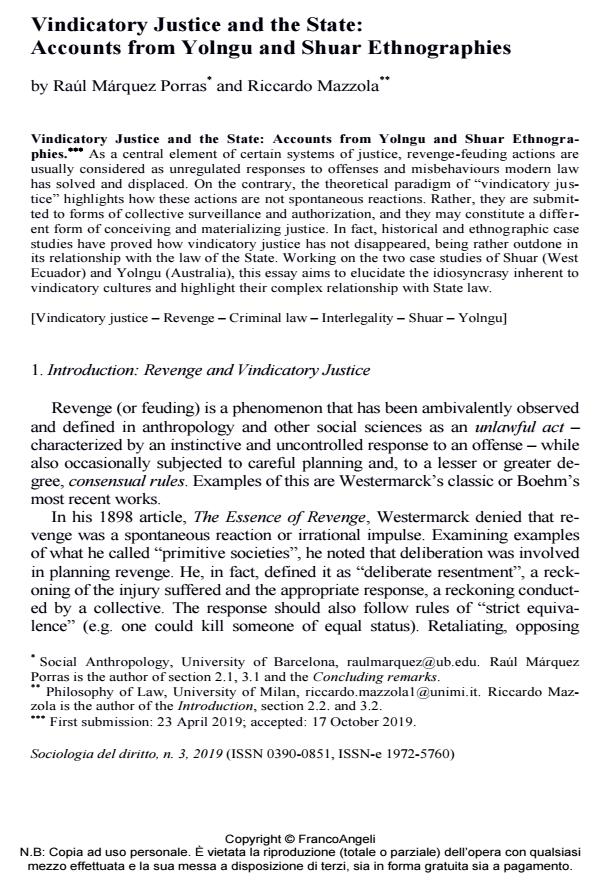Vindicatory Justice and the State: Accounts from Yolngu and Shuar Ethnogra-phies
Journal title SOCIOLOGIA DEL DIRITTO
Author/s Raúl Márquez Porras, Riccardo Mazzola
Publishing Year 2020 Issue 2019/3
Language English Pages 24 P. 71-94 File size 479 KB
DOI 10.3280/SD2019-003004
DOI is like a bar code for intellectual property: to have more infomation
click here
Below, you can see the article first page
If you want to buy this article in PDF format, you can do it, following the instructions to buy download credits

FrancoAngeli is member of Publishers International Linking Association, Inc (PILA), a not-for-profit association which run the CrossRef service enabling links to and from online scholarly content.
As a central element of certain systems of justice, revenge-feuding actions are usually consid-ered as unregulated responses to offenses and misbehaviours modern law has solved and dis-placed. On the contrary, the theoretical paradigm of "vindicatory justice" highlights how these actions are not spontaneous reactions. Rather, they are submitted to forms of collective surveil-lance and authorization, and they may constitute a different form of conceiving and materializ-ing justice. In fact, historical and ethnographic case studies have proved how vindicatory jus-tice has not disappeared, being rather outdone in its relationship with the law of the State. Working on the two case studies of Shuar (West Ecuador) and Yolngu (Australia), this essay aims to elucidate the idiosyncrasy inherent to vindicatory cultures and highlight their complex relationship with State law.
Keywords: Vindicatory justice - Revenge - Criminal law - Interlegality - Shuar - Yolngu
- "Costituzione appropriativa" e pratiche professionali. Gli agenti del campo giuridico di fronte alla mediazione Annalisa Tonarelli, in SOCIOLOGIA DEL DIRITTO 3/2021 pp.69
DOI: 10.3280/SD2020-003004 - Addressing Cultural Difference in Indigenous Copyright Cases Riccardo Mazzola, in Anthropological Forum /2023 pp.195
DOI: 10.1080/00664677.2023.2264519 - Terradas' Vindicatory Justice: An Attempt at Formalization Riccardo Mazzola, in SOCIOLOGIA DEL DIRITTO 3/2021 pp.52
DOI: 10.3280/SD2020-003003
Raúl Márquez Porras, Riccardo Mazzola, Vindicatory Justice and the State: Accounts from Yolngu and Shuar Ethnographies in "SOCIOLOGIA DEL DIRITTO " 3/2019, pp 71-94, DOI: 10.3280/SD2019-003004